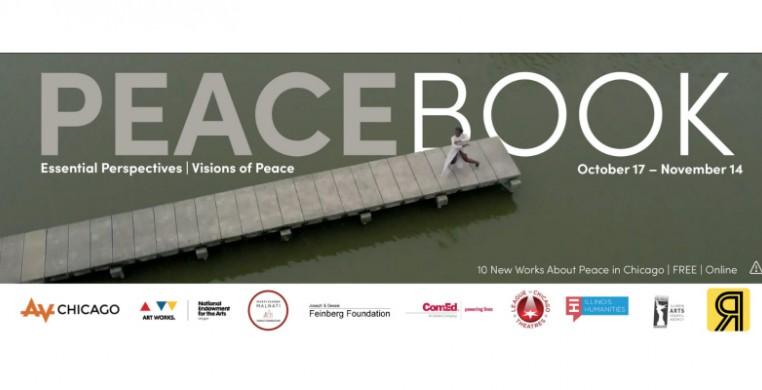
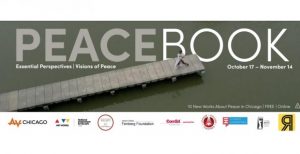 As more and more Chicago-based productions migrate online, Collaboraction Theatre is no exception. Artistic director Anthony Moseley and executive director Dr. Marcus Robinson have assembled a series of timely and moving videos by ten unique performing artists, entitled “Peacebook 2020”, as a means of creating necessary social change through knowledge, empathy, dialogue, and action. In its fifth year, “Peacebook” focuses on underrepresented minority groups, largely from the South and West Sides of Chicago, who seek a platform to showcase their talent and impart new points of view.
As more and more Chicago-based productions migrate online, Collaboraction Theatre is no exception. Artistic director Anthony Moseley and executive director Dr. Marcus Robinson have assembled a series of timely and moving videos by ten unique performing artists, entitled “Peacebook 2020”, as a means of creating necessary social change through knowledge, empathy, dialogue, and action. In its fifth year, “Peacebook” focuses on underrepresented minority groups, largely from the South and West Sides of Chicago, who seek a platform to showcase their talent and impart new points of view.
“Peacebook 2020” consists of two separate programs under the headings “Essential Perspectives” and “Visions of Peace.” “Essential Perspectives” has to do with how people have been affected by the Covid-19 pandemic and its economic fallout. “Visions of Peace” deals with ways of bringing people together from all different backgrounds to create some form of mutual understanding by exploring the commonality of diverse life experiences. Each of the two programs is made up of five acts, each featuring different performing artists involved in dance, music, poetry, and dramatic readings focused on politics, community, and autobiography. The performances move from one type of artistic expression to the next, with a break between each to run credits. Each of the ten videos is heartfelt and done with a creative edge; above all, each can stand on its own.
There are no stars attached to review because the ten shorts differ so much in tone and meaning that it isn’t fair to the various performing artists to paint them all with one broad brush. What they share in common is “We Still Dream”, the subheading for the entire month of programming.
In “Essential Perspectives”, one of the most poignant stories is the one called “Essential?… ‘Tengo que trabajar/ I have to work’” by Jasmin Cardenas, where she interviews Latinx workers who have lost their jobs with Covid-19 and are struggling to make ends meet. What is it like not to work for two or three months and not have enough money to live and pay bills? She follows a housekeeper and a dishwasher among others and asks, “How do you find hope?” Similarly, Willie “Prince Roc” Round has interviewed residents and community leaders in North Lawndale on how life on Chicago’s West Side has changed with Covid-19. The hip-hop dance number by PHENOM (a/k/a Teh’Ray Hale Sr.) exudes hopefulness during difficult times in “Rose From the Concrete.” And Sami Ismat describes his journey as a Syrian refugee fleeing political oppression—and how Covid only added to his pain and that of his late father.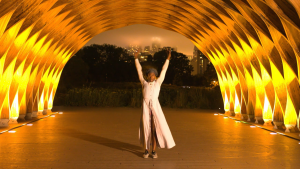
Mia Park’s segment in “Essential Perspectives” on being an Asian-American during the virus is somewhat similar to the one by Ada Cheng, entitled “A Letter to My Younger Self” in “Visions of Peace.” Whereas Park speaks the desire to hide her identity by wearing large sunglasses and a big mask, Cheng says that one should never feel the need to apologize for oneself. “A Letter to My Younger Self” is perhaps the most powerful and memorable segment of the ten, as Cheng explains very clearly how the pandemic has brought out racial bias and harassment from one moment to the next. She describes how Asian-Americans became vilified by the larger society with the onset of the coronavirus, as reflected by the normalization of jokes against those of Asian descent. Replete with words of wisdom to her younger self (played by a male actor), this is a message that all of us regardless of background can (and should) embrace.
“Visions of Peace” also features separate and unique dance numbers by Darling Squire, Vernon D. Gooden, and Matthew LaChapelle. Squire’s dance boasts of lovely visual effects; Gooden’s dance is flanked by excellent poetry that extols the freedom of movement, claiming that freedom is your birthright; while LaChapelle’s dance accompanies an autobiographical tale. Another autobiography, this one told by Luzzo in “I Used to Write with My Left Hand” explores inner darkness and themes such as child abuse and suicide.![]()
Collaboraction’s professional team has partnered with each of the performing artists to produce videos of high production quality and technical design.
All ten pieces can be found on streaming video, to be released throughout October and early November. Free tickets are available to watch the artists on Zoom, with the plan to bring together people from various communities, backgrounds, and walks of life into virtual watch parties to screen these performances. All of these events culminate with the Utopian Ball, a live virtual fundraiser to take place on November 14th.
Collaboraction’s “Peacebook 2020” will be released according to the following schedule:
Immediately following its debut on Saturday night, October 17th, the live stream will be available for free, 24/7 viewing on Collaboraction’s Facebook page.
Collaboraction will also host Thursday Night Watch Parties on four consecutive Thursdays:
October 22nd and 29th and November 5th and 12th, at 7:00 p.m.
The “Visions of Peace” program will be rebroadcast Saturday, November 7th, 7:00 p.m.
The “Essential Perspectives” program will be rebroadcast Sunday, November 8th, 3:00 p.m.
Additionally, each “Peacebook” short will roll out online as a stand-alone work on a staggered schedule during Collaboraction’s four-week “We Still Dream” campaign.
For more information about the show, ticketing, and the schedule, please go to https://www.collaboraction.org/peacebook.
Tickets to the Utopian Ball, Collaboraction’s annual gala fundraiser, are between $25-$250. For more information about the fundraiser, see https://www.collaboraction.org/the-utopian-ball.
Collaboraction is Chicago’s theatre for social change. Please consider a donation of any amount to support Collaboraction’s 24th season Transcendence Matching Campaign by going to Collaboraction.org/donate.
To see what others are saying, visit www.theatreinchicago.com
go to Review Round-Up and click at “Peacebook 2020”.


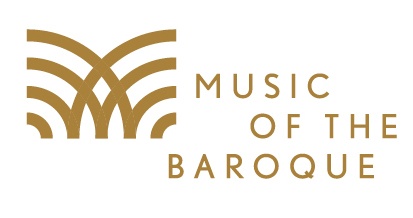

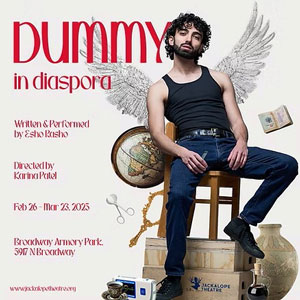

More Stories
“Dummy in Diaspora”
“The Magic School Bus: Lost in the Solar System”
“February House” reviewed by Julia W. Rath